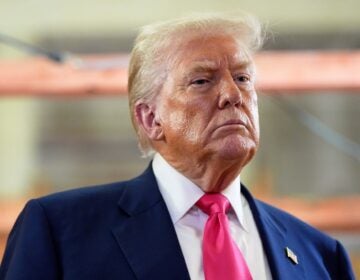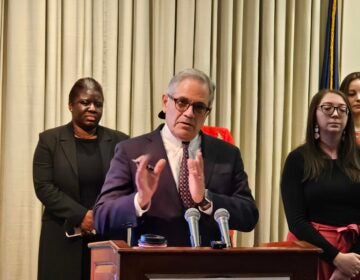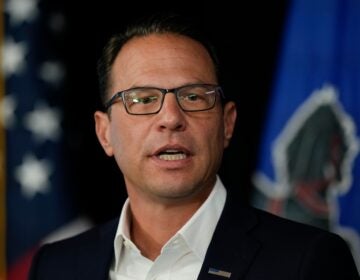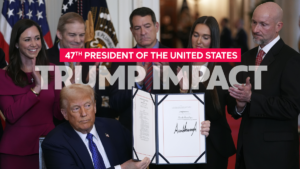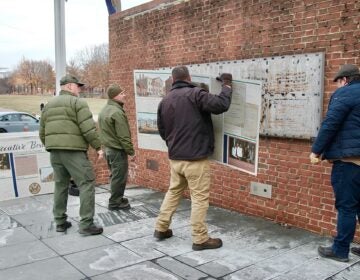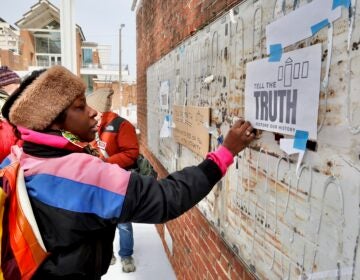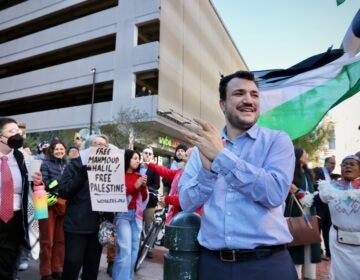As Trump threatens to send federal troops to U.S. cities, Philly District Attorney Krasner, religious leaders push back
While the president lacks the authority to take federal control of local police departments, he may be able to send troops, depending on a federal case in California.
Listen 1:23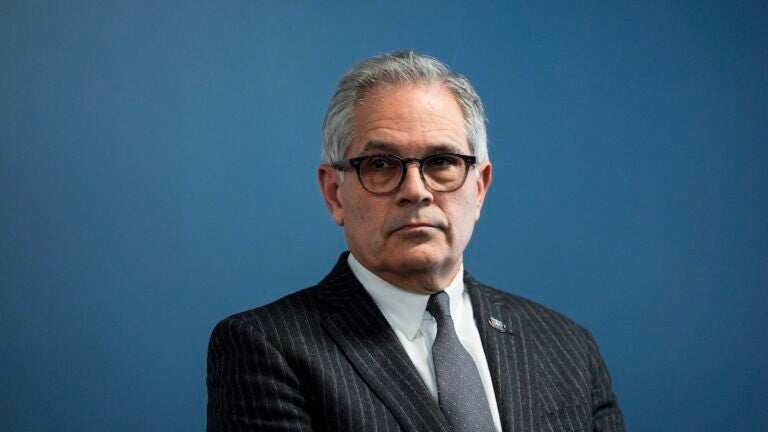
Philadelphia District Attorney Larry Krasner takes part in a news conference in Philadelphia, Monday, March 11, 2024. (AP Photo/Matt Rourke)
From Philly and the Pa. suburbs to South Jersey and Delaware, what would you like WHYY News to cover? Let us know!
Philadelphia District Attorney Larry Krasner joined local faith leaders to condemn President Donald Trump’s recent deployment of the National Guard in Washington, D.C., warning of broader implications as Trump signals federal interventions in other major U.S. cities.
Speaking to reporters at the Church of Christian Compassion in West Philly, Krasner warned that deploying the National Guard to Philadelphia would cause chaos and dismissed the president’s claim that federal troops are necessary to combat crime.
“I just never really thought that the preservation of the government of the United States would be an issue that I would have to face,” he said. “I just never thought that military invasion of America’s big cities with a fear-based racist agenda to pave a path for a military takeover is something that I would face, and I deeply wish I didn’t face it.”
The event took place a day after Trump issued a directive assuming federal command of the D.C. Metropolitan Police Department and deployed 800 National Guard troops to the nation’s capital. Trump declared that the strategy “will go further,” naming Baltimore, Chicago, Los Angeles, New York City and Oakland, California, as the next possible targets for similar deployments.
Crime
The president said that urban crime rates instigated a public safety emergency and that federal troops would “reestablish law, order and public safety.”
“It’s becoming a situation of complete and total lawlessness,” Trump told reporters at the White House on Monday.
However, Krasner pushed back on the president’s claim that he was motivated by violent crime.
“This is a city that right now, much like Washington, D.C. and other major American cities, is enjoying historic lows in crime,” he said, citing statistics released by the Philadelphia Police Department. “Any National Guardsperson the president puts in harm’s way for no good reason, is placed in a position to cause problems rather than solve them during a period of historic low crime.”
According to data from the Philadelphia Police Department, the number of homicides as of Aug. 11 has fallen to 138 — representing a 17.4% drop compared to the same period last year, when there were 167. Total violent crimes are down nearly 7.7%, and property crimes have declined by about 7.2%.
If the trend continues, Philadelphia could see its fewest homicides since the early 2010s, a significant shift from the pandemic-era peak of 562 homicides in 2021.
The city experienced its largest annual homicide drop in decades, with 268 homicides in 2024, which marked a 35% reduction from the prior year. Police recorded fewer than 1,090 shootings, the lowest in at least 10 years. Additionally, data show a 36% decrease in homicides, a 36% drop in shootings and an 18% reduction in robberies.
Philadelphia’s plunge in violent crime reflects a national trend. A recent analysis attributes part of this decline to the diminished disruptions of the pandemic, renewed community programs and targeted policing efforts. The national homicide rate reportedly fell by 12% in 2023, 14% in 2024 and is projected to drop another 20% in 2025.
Peter Andrews, who prosecuted Jan. 6 cases in his previous role as assistant U.S. attorney during the Biden administration, works for the Philadelphia District Attorney’s Office. He said that the president’s actions show it’s not about crime at all.

“The fact that the president would on the one hand pardon those defendants and then turn around and say, as he has said this week, that committing an offense against a law enforcement officer will be met with the strongest possible response — it’s not just hypocritical, it reveals that the president does not understand the rule of law,” he said. “He believes that there’s one rule if you support him and one rule if you do not.”
The White House did not respond to a request for comment, but Mark Umansky, ward leader for Philadelphia’s 9th Ward Republican Committee, told WHYY News that, despite recent drops in violent crime, the city’s crime rates are still higher than they should be.
“With a population of 1.5 million, we’ve recorded 138 homicides this year in Philadelphia, nearly as many as New York City’s 146, despite New York having more than six times our population,” he said via email. “While every large city has had a decrease in crime this year, Philadelphia lags behind nearly all of them percentage-wise. The numbers speak for themselves, and they don’t even account for other violent crimes, property crimes, and unreported incidents.”
What power does the president have?
While the president has some authority to place Washington’s Metropolitan Police Department under temporary “federal control,” he does not have the power to do so in Philadelphia.
According to Claire Finkelstein, a law professor at the University of Pennsylvania Law School, where she is also director of the Center for Ethics and the Rule of Law, the U.S. Constitution clearly prohibits it.
“The principles of federalism under the 10th Amendment put Philadelphia police firmly under the control of state and local government,” she said. “Therefore, there wouldn’t be any basis and it would be firmly illegal for the federal government to seize local police forces other than D.C.”
The law is less clear when it comes to taking federal control of a state’s National Guard or sending in federal troops against a state’s own wishes. According to Finkelstein, the president can take control of the National Guard if he is legitimately concerned about the danger of a rebellion. He can also invoke the Insurrection Act which, she said, is a lower bar.
“If we have demonstrations such as we had in the summer of 2020 that turned violent, then we could very well expect to see something like what’s going on in California, or frankly, what happened in Portland in 2020 when the federal government sent out federal agents,” she said.
Andrews, a supervisor in the district attorney’s Federal Litigation Unit, argued that “the conditions required to trigger the Insurrection Act in Philadelphia or any other major city are not met.”
“There is no insurrection on the streets,” he said. Therefore, “it would be unconstitutional for the president to take certain steps like inviting out-of-state National Guard troops into Philadelphia, and federalized without the governor’s consent.”
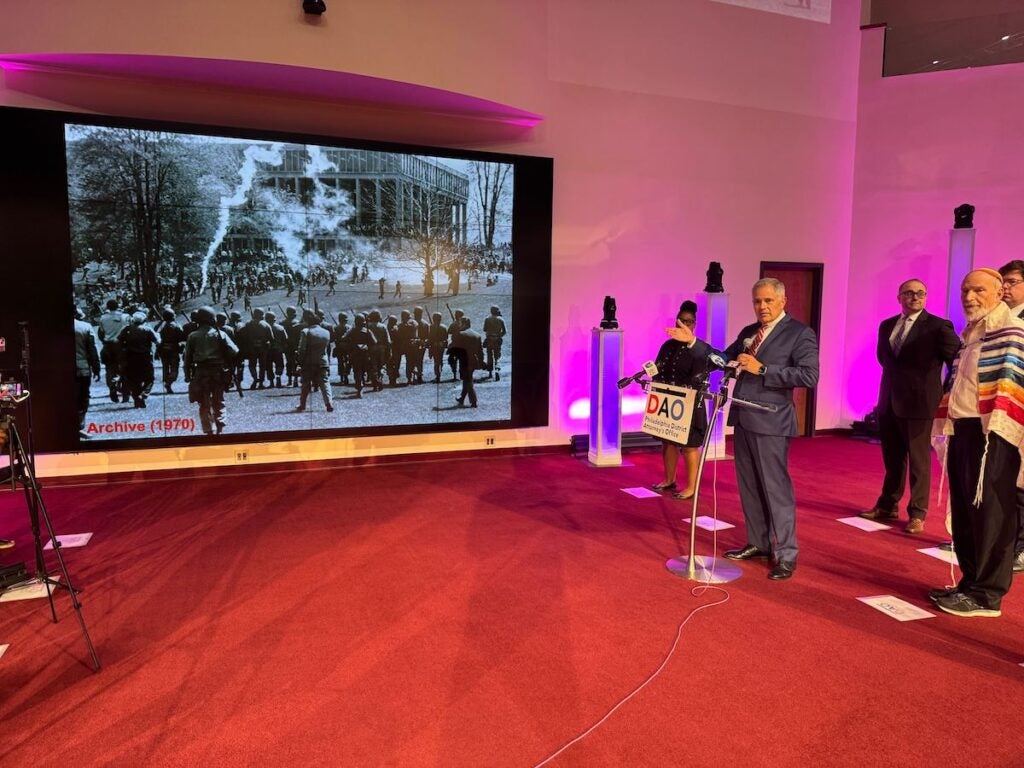
Finkelstein, however, noted that the president’s powers are currently under review by a federal court after California sued the administration over federalizing the National Guard in California. At question is whether a 19th-century law called the Posse Comitatus Act prohibits the president from using the military as a domestic police force.
“This issue has never been litigated and it’s important to note the Supreme Court has never issued an opinion on what the parameters of the Posse Comitatus Act are,” she said. “And so if this scenario were to play out in Pennsylvania, we really don’t know exactly what a higher-level federal court would say about what counts as part of Posse Comitatus and what’s not. But all the states should be watching the case in California very closely because that’s at least one indication on the first level of what a federal court might do.”
Umansky, a lawyer in private practice, agreed that the “barring major instability, disaster, or tragedy, the federal government has no business interfering in local policing.”
“This is a cornerstone of federalism and the plenary police power reserved to the states by our Constitution, adding “the men and women of the Philadelphia Police Department are more than capable of tackling crime, if given the full support of our city’s leadership.”
However, he faulted Krasner for the higher crime rates.
A moral issue
At the event, Islamic, Jewish and Christian clergy framed the potential federal intrusions as moral affronts, saying the very idea of a militarized crackdown on American citizens, particularly in communities of color, is antithetical to their ideals.
Kenneth Nuriddin, resident imam of Philadelphia Masjid, stressed the responsibility to protect democratic and constitutional norms.
“This is our moral agenda, and in order to have a more perfect union … we have to get rid of things that are divisive,” he said. “We have different geographical locations, but the thing that binds us all together are the documents that we all agreed to accept as being citizens in America.”

A Vietnam War veteran, Nuriddin recalled seeing the “montage of destroying the village to save it,” a warning he said against an “invasion” of Philadelphia.
Carolyn Cavaness, senior pastor at Mother Bethel African Methodist Episcopal Church, added that all three of the religious leaders “come from a tradition which teaches us to love our neighbors as we love ourselves.”
“We come to show that this is not and will not be allowed here,” she said. “And also standing in solidarity with our brothers and sisters who are now living in fear and not even knowing if perhaps what all is being purported to be said, if it will actually happen to also know that we must be vigilant relative to what is happening around us, but also as people of faith that we stand on and believe and uplift a tradition that we will trample over oppressors who desire to take over our rights.”
Rabbi Mordechai Liebling added that the president is “using the rhetoric of hatred, not the rhetoric of connection.”
“Anything that divides us, that sets us up against each other, is what I call sin,” he said. “That man is a sinner. That man is dividing us. That man is seeding hatred. That man doesn’t care about the welfare and well-being of the citizens and the residents of this country. We must resist his invasion of our cities and we must resist his attempt to overturn democracy.”

Get daily updates from WHYY News!
WHYY is your source for fact-based, in-depth journalism and information. As a nonprofit organization, we rely on financial support from readers like you. Please give today.



